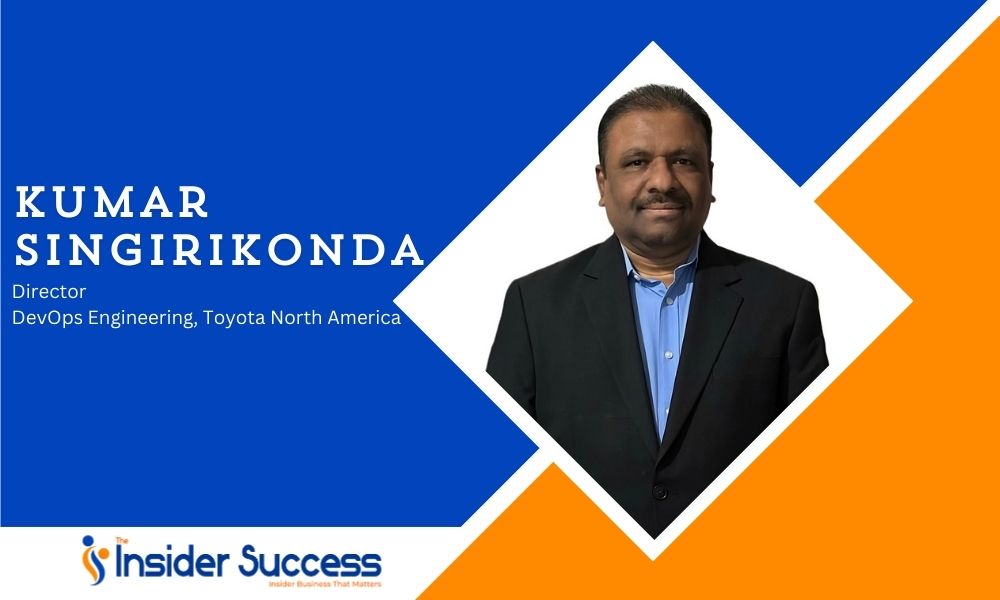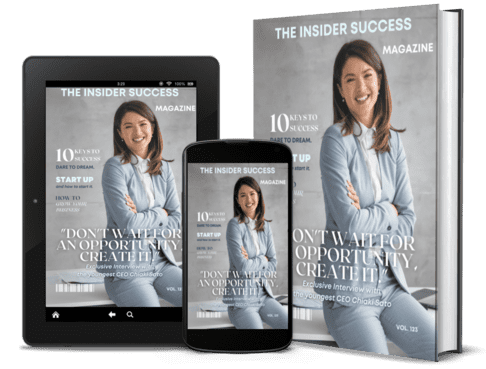In today’s rapidly shifting digital landscape, leaders are not only expected to manage technology but to reimagine how it can shape businesses, industries, and society at large. Few embody this vision more fully than Ekambar Kumar Singirikonda, Director of DevOps Engineering at Toyota North America, acclaimed author of DevOps Automation Cookbook, and a globally respected voice in enterprise technology.
With more than two decades of experience across banking, telecom, and automotive, Kumar’s journey is a powerful example of how technical mastery, strategic foresight, and people-centered leadership can combine to transform organizations. His work has left an impact not only in boardrooms and global enterprises but also in classrooms, mentoring circles, and communities, making him a standout among The Most Inspiring Leaders to Follow in 2025.
A Journey Rooted in Curiosity and Purpose
For Kumar, the spark that ignited his career was never about chasing trends or titles. It was born from an early recognition that technology could change lives and redefine possibilities. Growing up in an era when innovation was reshaping industries at lightning speed, he saw technology not as a set of systems but as a force for transformation.
“What inspired me,” Kumar recalls, “was the possibility of using technology to solve real-world problems at scale. From the very beginning, I wanted to work at the intersection of strategy, leadership, and innovation.”
That mindset became his compass. Over the years, he led cloud migrations that enabled agility in highly regulated industries, designed automation frameworks that saved millions in operational costs, and guided enterprises through cross-industry transformations. Each milestone shaped his approach to leadership, resilient, adaptive, and focused on long-term impact rather than short-term wins.
His curiosity did not just rest on solving problems but on asking better questions. “Why do processes fail? Why do teams struggle with adoption? Why do large organizations resist change?” Those questions drove him deeper into not only the technology but also the culture that surrounds it. For Kumar, technology without cultural transformation is like an engine without fuel.
Today, when Kumar reflects on being recognized as one of the Most Inspiring Leaders to Follow in 2025, he does not see it as a personal victory. Instead, he views it as validation of his philosophy: leadership is not about managing results but about inspiring others, leaving a legacy of innovation, and empowering people to achieve more than they believed possible.
Defining Moments and Lessons Learned
Kumar’s career is filled with pivotal moments that shaped his leadership style. Early on, he learned the value of adaptability while working in the fast-paced telecom sector, where speed and scale were non-negotiable. Later, in banking, he confronted the importance of regulatory compliance and risk management. Moving into the automotive industry gave him yet another perspective, precision, safety, and reliability were now the benchmarks.
“These industries each taught me something different,” Kumar explains. “In banking, it was about discipline. In telecom, it was about speed. In automotive, it became about precision and safety. Blending those lessons has been invaluable in leading large-scale technology transformations.”
One of his most defining experiences came when he was tasked with spearheading automation initiatives that fundamentally reshaped operations. These programs did not simply optimize costs; they transformed entire workflows, making teams more agile and enabling leaders to focus on innovation rather than firefighting.
Another milestone was leading Toyota’s efforts to embrace cloud-native architectures while building a culture of resilience. These were not just technical projects but cultural transformations, showing that organizations can modernize without losing stability or trust. Kumar recalls moments of resistance, where teams feared that automation might replace their roles. Instead of dismissing those fears, he addressed them with empathy, demonstrating that automation was about eliminating repetitive work so teams could focus on creativity and higher-value contributions.
Leadership at Toyota: Balancing Innovation with Scale
At Toyota North America, Kumar leads a global organization of more than 150 engineers and architects. The challenge of aligning DevOps innovation with the needs of one of the world’s largest automotive companies is immense, but it is a challenge Kumar thrives on.
“Large organizations require stability, compliance, and reliability,” he explains. “But innovation cannot be sacrificed. My role is to create the right guardrails, frameworks that allow teams to experiment, adopt emerging technologies, and innovate, all while ensuring operational excellence.”
He has introduced frameworks that integrate security, automation, and scalability into every stage of development. These principles are not add-ons, they are embedded from the start, making systems more efficient, more secure, and more resilient.
For Kumar, the future of enterprise IT lies in automation and AIOps. “Automation is no longer about efficiency, it’s about survival,” he says. “With AIOps, we can predict incidents before they occur, self-heal systems, and free teams to focus on higher-value innovation.”
His leadership style is less about micromanaging and more about empowering. He fosters a culture of continuous learning by encouraging certifications, knowledge-sharing communities, and hands-on experimentation. His belief is simple: when people feel trusted and supported, innovation follows naturally.
Inspiring People, Building Culture
For all his technical expertise, Kumar often emphasizes that the greatest transformations are cultural, not technological. “Technology will always evolve,” he says. “What really determines whether organizations adapt successfully is culture and culture is built on people.”
Trust is the foundation of his leadership. In times of uncertainty or rapid change, he practices transparency, acknowledging challenges and communicating openly. His philosophy is simple: leaders who show authenticity and empathy inspire resilience in others.
Kumar takes his role as mentor seriously. Through his involvement with the McCombs School of Business at UT Austin, the Harvard Business Review Advisory Council, and global mentoring programs, he guides the next generation of leaders. He encourages young professionals to see leadership not just as a position but as an opportunity to inspire.
Leading global teams comes with its own set of challenges time zones, cultural differences, and communication barriers. Kumar addresses these by focusing on inclusion and shared purpose. “When people feel their voices matter,” he explains, “geography ceases to be a barrier. They work together because they believe in something larger than themselves.”
He often draws a distinction between effective leadership and inspiring leadership. “An effective leader delivers results,” he says. “An inspiring leader delivers results while helping others see and achieve their fullest potential.”
Vision for the Future: Innovation, AI, and Beyond
Looking toward 2025 and beyond, Kumar sees both opportunities and challenges for global enterprises. Opportunities will come from AI-driven automation, cloud-native platforms, and the increasing value of digital trust. Challenges will include cybersecurity threats, the ongoing shortage of tech talent, and the struggle to modernize legacy systems without disrupting business continuity.
He envisions DevOps evolving into a model that integrates AI and edge computing at scale. “We’re moving toward intelligent, self-managing systems that can predict, adapt, and optimize in real time,” he says. “The next five years will redefine what enterprise IT looks like.”
At Toyota, he is already preparing for that future. His teams are exploring AI-driven testing frameworks, predictive analytics, and proactive monitoring to ensure resilience. He believes that organizations that can marry automation with human insight will have the greatest competitive advantage.
Kumar’s influence extends beyond Toyota through his role as an author and speaker. His DevOps Automation Cookbook has become a trusted resource for professionals worldwide, breaking down complex concepts into actionable strategies. Through articles, lectures, and keynote speeches, he shares his vision for a future where automation, security, and inclusion go hand in hand.
Legacy of Impact
When asked about the legacy he hopes to leave, Kumar frames it at three levels: organizational, industry, and personal.
“At the organizational level, I want to leave behind resilient systems and empowered teams. At the industry level, I hope to contribute to best practices in DevOps and cloud engineering. And at a personal level, I want to be remembered as someone who mentored, inspired, and lifted others along the way.”
That legacy already extends beyond the workplace. As a Board Director at the Gift of Adoption Fund, Kumar helps unite children with permanent families, reflecting his belief that leadership should integrate professional excellence with social responsibility. His passion for social impact is a reminder that leadership is not measured only in professional accomplishments but in the lives we touch beyond our careers.
Closing Reflection
In an era where volatility defines economies and technology evolves faster than ever, Kumar Singirikonda stands out as a leader who blends vision with execution, innovation with empathy, and strategy with inspiration.
His journey, from pioneering automation at Toyota to mentoring global leaders and shaping conversations at the highest levels of enterprise technology demonstrates what it means to lead with purpose.
For young professionals and seasoned executives alike, Kumar’s story carries a simple but powerful reminder: the future belongs to those who innovate boldly, lead authentically, and inspire continuously.




